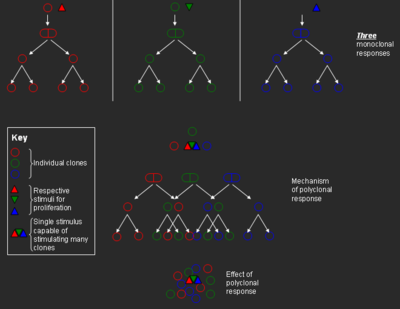- Clone (cell biology)
-
A clone is a group of identical cells that share a common ancestry, meaning they are derived from the same mother cell.[1]
Clonality implies the state of a cell or a substance being derived from one source or the other. Thus there are terms like polyclonal--derived from many clones; oligoclonal[2]--derived from a few clones; and, monoclonal--derived from one clone. These terms are most commonly used in context of antibodies or immunocytes.
Contents
Contexts
This concept of clone assumes importance as all the cells that form a clone share common ancestry, which has a very significant consequence: shared genotype.
- One of the most prominent usage is in describing a clone of B cells. The B cells in the body have two important phenotypes (functional forms) -- the antibody secreting, terminally differentiated (that is, they cannot divide further) plasma cells, and the memory and the naive cells -- both of which retain their proliferative potential.
- Another important area where one can talk of "clones" of cells is neoplasms.[3] Many of the tumors derive from one (sufficiently) mutated cell, so they are technically a single clone of cells. However, during course of cell division, one of the cells can get mutated further and acquire new characteristics to diverge as a new clone. This is how, in fact, drug resistance could be acquired in many cases.
- All the granulosa cells in a Graafian follicle are in fact a clone.
- Paroxysmal nocturnal hemoglobinuria is a disorder of bone marrow cells resulting in shortened life of red blood cells, which is also a result of clonal expansion, i.e., all the altered cells are originally derived from a single cell, which also somewhat compromises the functioning of other "normal" bone marrow cells.[4]
Basis of clonal proliferation
Most other cells cannot divide indefinitely as after a few cycles of cell division the cells stop expressing an enzyme telomerase. The genetic material, in the form of deoxyribonucleic acid (DNA), continues to shorten with each cell division, and cells eventually stop dividing when they sense that their DNA is critically shortened. However, this enzyme in "youthful" cells replaces these lost bits (nucleotides) of DNA, thus making almost unlimited cycles of cell division possible. It is believed that the above mentioned tissues have a constitutional elevated expression of telomerase. When ultimately many cells are produced by a single cell, clonal expansion is said to have taken place.
Concept of clonal colony
A somewhat similar concept is that of clonal colony (also called a genet), wherein the cells (usually unicellular) also share a common ancestry, but which also requires the products of clonal expansion to reside at "one place", or in close proximity. A clonal colony would be well exemplified by a bacterial culture colony, or the bacterial films that are more likely to be found in vivo (e.g., in infected multicellular hosts). Whereas, the cells of clones dealt with here are specialized cells of a multicellular organism (usually vertebrates), and reside at quite distant places. For instance, two plasma cells belonging to the same clone could be derived from different memory cells (in turn with shared clonality) and could be residing in quite distant locations, such as the cervical (in the neck) and inguinal (in the groin) lymph nodes.
See also
- Polyclonal antibodies
- Polyclonal response
- Clone (B-cell biology)
References
- ^ Clone definition - Medical Dictionary definitions of popular medical terms easily defined on MedTerms
- ^ oligoclonal - Definition from Merriam-Webster's Medical Dictionary
- ^ Clonal Origin and Expansions in Neoplasms: Biologic and Technical Aspects Must Be Considered Together - Pozo-Garcia et al. 162 (1): 353 - American Journal of Pathology
- ^ Bunn, Franklin; Wendell Rosse (2005). Harrison's PRINCIPLES OF INTERNAL MEDICINE, Sixteenth Edition. 1. The McGraw-Hill Companies, Inc.. p. 616. ISBN 0-07-144746-6.
Into matter Cellular differentiation: Stem cells / progenitor cell Sources/types Cell potency Totipotent (Zygote, Spore, Morula) · Pluripotent (Embryonic stem cell, Callus) · Multipotent (Progenitor cell: Endothelial stem cell, Hematopoietic stem cell, Mesenchymal stem cell, Neural stem cell) · Unipotent (Precursor cell)Related articles Stem cell treatments · Stem cell controversy · Stem cell line · Stem cell laws · Stem cell laws and policy in the United StatesMolecular biology and Cell biology Biotechnology - Bioinformatics
- Cloning
- Genetic engineering
- Genetically modified organisms
- Stem cells
- Vaccination
Cell biology - Cell cycle
- Cell signaling
- Cells
- Cytoskeleton
- Organelles
- Membrane biology
- Signal transduction
- Clone (cell biology)
Developmental biology - Aging
- Embryology
- Morphogens
- Gastrulation
- Growth factors
- Neurulation
- Teratogens
Genetics - Applied genetics
- Chromosomes
- DNA
- Genetic disorders
- Genetic engineering
- Genes
- Geneticists
- Molecular genetics
- Mutation
- Population genetics
- RNA
Microbiology - Antibiotics
- Bacteriology
- Extremophiles
- Fungi
- Microbiologists
- Mycology
- Virology
- Immunology:
Molecular biology - Biochemists
- Biochemistry topics
- Biomolecules
- Molecular biology
- Molecular biologists
- Peptides
- Proteins
Biological techniques and tools - Cloning
- Electrophoresis
- In situ hybridization
- Gene knockout
- Microscopes
- Northern blot
- Polymerase chain reaction
- Southern blot
- Western blot
- X-ray Crystallography
Categories:
Wikimedia Foundation. 2010.

